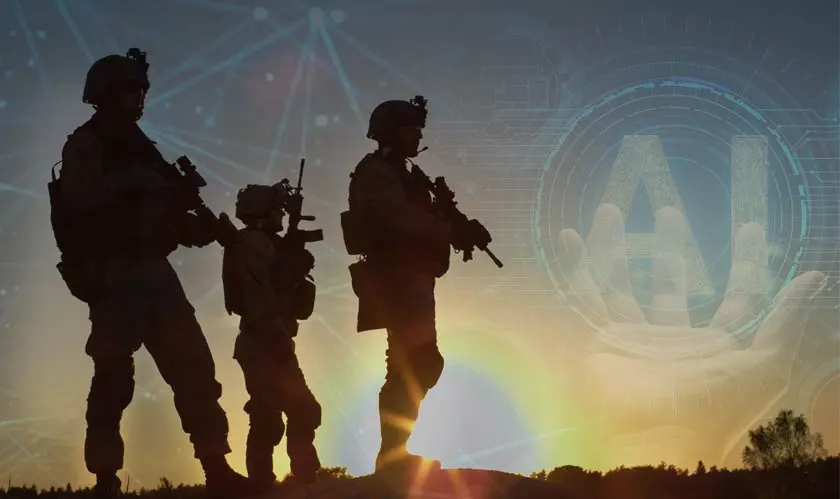The Role of Artificial Intelligence in Modern Defense
The Significance of Artificial Intelligence in Modern Defense
Artificial Intelligence

CIO Bulletin
2023-09-04
While Artificial Intelligence (AI) has made a huge impact on all major areas of society, its usage and impact have not come close to its profound potential in the defense area. The advancements in AI have brought about a new era in redefining warfare, enhancing decision-making, and the seamless incorporation of intelligence and operations. In this article, we delve a little deeper into the impact of AI in modern defense, its benefits, and its future.
Modern military operations and defense systems are quickly integrating AI into their operations. AI is being applied to increase productivity, accuracy, and safety in a variety of military applications, from autonomous drones and robotics to intelligent logistics systems and decision-supporting tools. Modern defensive systems now include AI in every aspect, including intelligence gathering, command and control, and weaponry. AI systems sift through enormous volumes of data from satellites, drones, and cyber networks to find patterns and risks that humans would be unable to recognize. This permits quicker reaction times and more efficient decision-making.
The impact of artificial intelligence on the defense sector is still being felt, along with a wide range of other worries.
There is rising concern about how current and future propagation may affect areas such as weaponization, enfeeblement, diminished epistemology, value lock-in, deceit, biases, and probable job loss as the country moves toward an increasingly AI-dominated future. However, these difficulties coexist with enormous potential advantages, such as increased effectiveness, precision, and tactical advantage in defense applications.
The Future of Defensive Weaponry

AI has the potential to significantly alter how war is fought in the future. The establishment of autonomous weaponry, such as drones or ground robots that may be programmed to recognize and engage targets without human interaction is one potential effect of AI. These systems might make military personnel less likely to suffer fatalities while also speeding up and improving the precision of military operations. However, there are also issues with the moral ramifications of employing such systems, as well as the chance that they could be breached or exploited in ways that are unanticipated or undesired.
AI-Powered Drones and Surveillance
Modern defense is benefiting from AI-powered drones and surveillance. With this new advanced technology, drones and surveillance systems have intelligent object recognition and tracking, allowing them to identify individuals or subjects of interest, track their movements, and pass that important information in real-time to human operators.
AI-powered drones have sensors to detect objects as well as scan unknown terrain and identify safe pathways in suburban areas, leading people to safety.
AI's Role in Enhancing Military Intelligence
The way military personnel acquire and evaluate intelligence is changing as a result of AI, giving them new capabilities to better comprehend their adversaries and defend their own forces. The following are some of the major advantages of AI in military intelligence:

- Enhanced speed and accuracy: AI systems' capacity to analyze vast volumes of data swiftly and accurately enables military intelligence organizations to gather information more quickly and precisely.
- Improved resource utilization: Routine work can be automated by AI systems, freeing up human intelligence analysts to concentrate on more strategic and challenging issues.
- Reduced risk to human life: By using machines to complete hazardous or difficult tasks, militaries can lessen the risk to their personnel while boosting operational effectiveness.
AI-Assisted Decision Making in Defense
Another way the military is using AI to transform military defense systems is by harnessing it for military decision-making. The one area where it is often hard to make decisions is during medical emergencies. Certain defense researchers believe that using AI to make hard decisions on the battlefield will allow humans to simply follow instructions and forego the overwhelming necessity of making rational decisions in times of extremely emotional outbreaks. However, AI systems still generate a level of uncertainty when it comes to technical failures that might lead to miscalculations and an increase in conflict and crisis.
Conclusion
In conclusion, AI is becoming more and more significant in the defense industry and has the ability to completely change both warfare and defense. AI has the ability to increase effectiveness, precision, and safety in a variety of military scenarios, from autonomous weapons systems to intelligent logistical systems and decision support tools. However, the application of AI in defense also brings up a number of intricate ethical, legal, and tactical issues that need to be thoroughly thought through. Therefore, it is crucial that the development and application of AI in defense be guided by unambiguous ethical frameworks and principles and that there be constant discussion and debate about the advantages and disadvantages of its use.
FAQs
How is AI changing the landscape of modern defense?
The landscape of modern defense is changing with AI’s potential to streamline operations, increase effective decision-making, and help with accuracy in military missions.
What are the top 10 future military technologies to watch for?
- Artificial Intelligence
- Advanced Defense Equipment
- Robotics and Autonomous Systems
- Internet of Military Things
- Cyber Warfare
- Immersive Technologies
- Additive Manufacturing
- Big Data and Analytics
- 5G Connectivity
- Blockchain
How does AI enhance cybersecurity in the military?
AI technology can often identify and respond much faster in real-time when it comes to fighting off potential cyber threats as compared to traditional methods.
What ethical concerns surround AI in defense technology?
Some of the ethical concerns that arise with AI defense technology are questions of accountability, potential hacking and misusing, and the loss of human control in life-and-death situations.
What economic impact do AI investments have on the defense sector?
AI investments in the defense sector can disrupt the traditional key roles of individuals, causing socio-economic concerns and affecting and reducing the accumulated knowledge and experience of the military.


Comments
Post a Comment